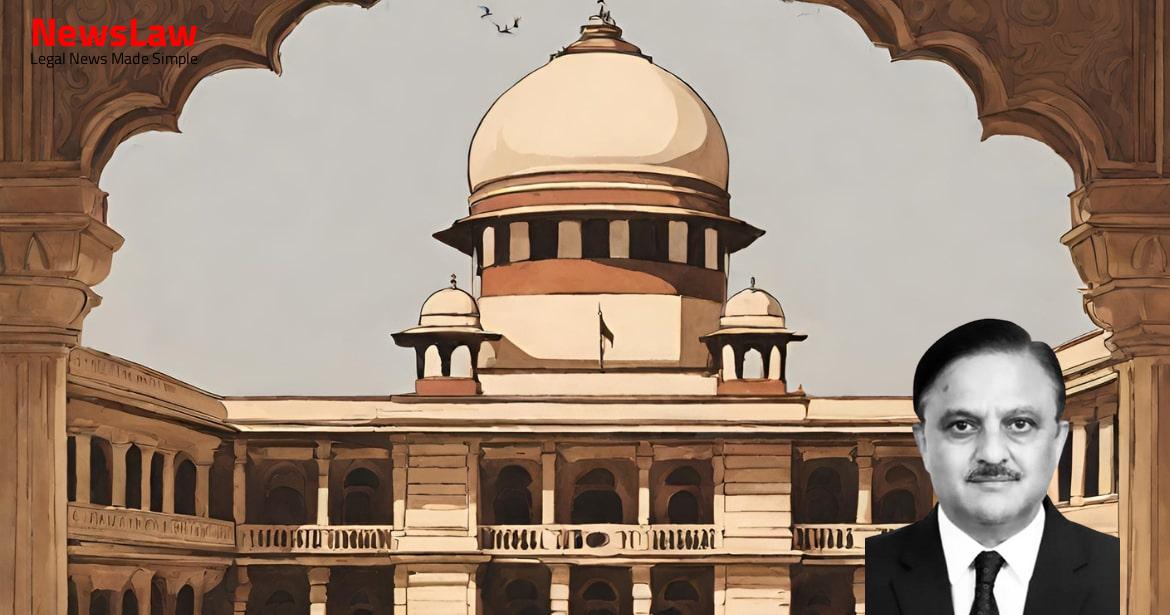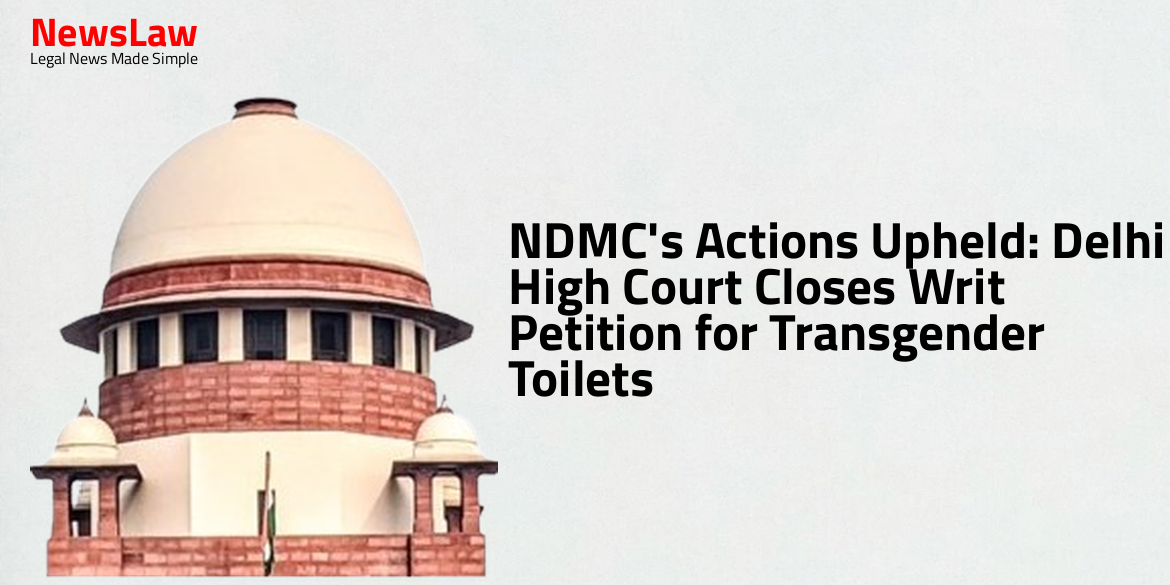In a significant legal development, the Supreme Court of India has pronounced a landmark judgment in a dispute arising from a bridge construction project. The case involved a contractor appointed by the State of West Bengal, and a subsequent arbitration process. The judgment addresses key aspects of the Arbitration Act and sets a precedent for future arbitration cases. Stay tuned to learn more about the implications of this ruling on arbitration proceedings.
Facts
- The State of West Bengal appointed the respondent as a contractor for bridge construction
- A dispute arose between the parties, leading to invocation of arbitration clause
- A sole arbitrator was appointed to resolve the dispute
- The appellants filed a petition under Section 34 of the Arbitration Act on 31st October 2022
- High Court dismissed the petition citing bar of limitation
- The Arbitral Tribunal passed an award on 30 June 2022 directing the appellants to pay Rs. 2,11,67,054.00 to the respondent with interest.
- The counter-claim made by the appellants was dismissed in the award.
- The High Court of Judicature at Calcutta was closed for pooja vacation from 1 October 2022 to 30 October 2022.
- The High Court determined that the limitation period for filing a petition under Section 34 expired on 30 September 2022.
- The appellants received a copy of the award on the same day it was passed, i.e., 30 June 2022.
Also Read: Judgment on Interim Stay of Bail Orders: The Case of Liberty vs. Judicial Discretion
Arguments
- The learned counsel for the appellants argued that the petition under Section 34 of the Arbitration Act filed after the re-opening of the Court on 31 October 2022 is within limitation as per Section 9 of the General Clauses Act, 1897.
- The High Court granted a certificate for appeal to the Supreme Court under Article 133(1) and Article 134(A)(a) of the Constitution of India in the impugned judgment.
- The prescribed period of limitation for filing the Section 34 petition ended on 1 October 2022, which was the first day of pooja vacation according to the appellants’ counsel’s submission.
- The appellants’ counsel pointed out that the e-filing of the petition was not allowed during pooja vacation as per the relevant e-filing notification, which permitted e-filing for urgent matters only.
- The counsel cited a precedent in the case of State of Himachal Pradesh and Another v. Himachal Techno Engineers and Another in support of their argument.
- The respondent’s counsel supported the findings of the High Court.
- The benefit of Section 4 of the Limitation Act is available only if the proceedings are filed within the prescribed period of limitation, which is three months in this case as per Section 34(3) of the Arbitration Act.
- The counsel referenced a decision of this court in the case of Assam Urban Water Supply & Sewerage Board v Subash Projects & Mktg. Ltd.
Also Read: Zaveri & Co. Pvt. Ltd. vs. ACIL: Legal Precedent on Guarantor Liability
Analysis
- The period of limitation for filing a petition under Section 34 of the Arbitration Act begins from the date the appellants received the award, which is 30 June 2022.
- Section 5 of the Limitation Act is held to be excluded in petitions under Section 34 due to the language used in the proviso of sub-section (3) of Section 34.
- Section 4 of the Limitation Act is not applicable in this case as the 30-day period mentioned in the proviso following sub-section (3) of Section 34 is not considered the ‘period of limitation’ or the ‘prescribed period’.
- From 1st July 2022, the last day for filing the petition under Section 34 would be 30 September 2022.
- Between 1 October 2022 and 30 October 2022, the High Court was closed for pooja vacation which further affects the computation of the limitation period.
- The period of limitation for filing a petition under Section 34 of the Arbitration Act is set by sub-section (3) of Section 34 and not Section 4 of the Limitation Act.
- The prescribed period for any suit, appeal or application expires on a day when the court is closed, the suit, appeal or application may be instituted, preferred or made on the day when the court re-opens.
- A court shall be considered closed on a day within the meaning of this section.
- The ‘period of limitation’ refers to the limitation prescribed for any suit, appeal or application as per the Schedule.
- The ‘prescribed period’ is calculated in accordance with the provisions of the Act.
- For setting aside an arbitral award, the prescribed period for making an application is three months as per Section 34(3) of the 1996 Act.
- An application for setting aside must be made within three months from the date of receiving the arbitral award or the disposal of a request under section 33.
- The Court may entertain the application within a further period of thirty days if satisfied that the applicant was prevented by sufficient cause from applying within the initial three months.
- The day from which the limitation period is to be reckoned must be excluded as per Section 12(1) of the Limitation Act.
- During any part of its normal working hours if the entity remains closed on a particular day, it is considered closed for the entire day.
- The meaning of ‘the prescribed period’ has been established in the case of Assam Urban Water Supply & Sewerage Board v. Subash Projects & Mktg. Ltd.
- The law regarding ‘the prescribed period’ has been laid down in paragraphs 13 and 14 of the mentioned case.
- The period of limitation under Section 34 could have been extended by a maximum of 30 days as per the proviso to sub-section (3) of the Section.
- The prescribed period within the meaning of Section 4 of the Limitation Act ended on 30 September 2022 in this case.
- The decision in the case of State of Himachal Pradesh and Another v. Himachal Techno Engineers and Another was relied upon, which supports the conclusion that the appellants were not entitled to the benefit of Section 4 of the Limitation Act.
- The High Court was correct in holding that the petition filed by the appellants under Section 34 of the Arbitration Act was not filed within the specified period under sub-section (3) of Section 34.
Also Read: The Disputed Quarrel: Legal Analysis of the Case Involving Muthu and Kesavan
Decision
- The appeal was found to have no merit and was dismissed.
- The maximum period of 30 days for the appeal had expired on 30 October 2022.
- The petition in question was filed on 31 October 2022, after the expiration of the maximum period.
Case Title: THE STATE OF WEST BENGAL REPRESENTED THROUGH THE SECRETARY Vs. RAJPATH CONTRACTORS AND ENGINEERS LTD. (2024 INSC 477)
Case Number: C.A. No.-007426 – 2023



